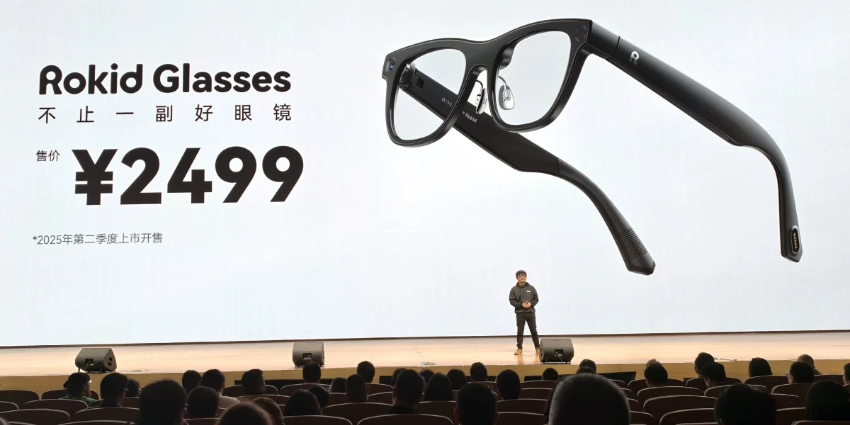Rokid, a Chinese augmented-reality (AR) device maker, has captured attention with its innovative AI glasses that recently made waves – both on social media and in the stock market.
The company’s founder, Misa Zhu Mingming, demonstrated the practical application of these glasses at a government event in Hangzhou, where he had his speech notes projected directly onto the AR glasses he was wearing. According to the company, Zhu was able to flip through the virtual pages using a smart ring on his finger, using technology’s intuitive interface.
The demonstration quickly went viral in China, with the hashtag #ScriptOnGlassesTurnPagesWithRing becoming “the tenth top-trending topic on Chinese microblogging site Sina. This attention translated to market interest, as The AI Wearable Index, which tracks 50 publicly-listed Chinese companies related to the sector, surged more than 10% in the past five trading days.
Rokid’s Technical Capabilities
What sets Rokid Glasses apart is their integration with Alibaba’s Qwen LLMs, allowing for advanced AI functionalities in a lightweight wearable format. Unlike some competitors, these glasses feature a true AR display, projecting information directly into the user’s field of vision.
The technology has drawn comparisons to Meta Platforms’ Orion, a prototype unveiled last September that the Facebook owner touted as ‘the most advanced pair of AR glasses ever made’.” However, Rokid’s offering appears closer to market readiness than some competing products.
Zhu was keen to emphasise Rokid’s ‘substance over style’ approach and demonstrate how they could be used in the real world, stating:
We’re in a situation where large companies do a great job in publicity but perform poorly in product development. This is exactly what we like, because large companies like [Apple with its] Vision Pro and Meta attract traffic, and we can take advantage of the attention.
The Rokid Glasses, comparable to sunglasses at 49 grams, come equipped with large language models (LLMs) and are designed to recognise images, interpret words and navigate roads. With a battery life of about four hours after a quick 10-minute charge, these glasses are set to be priced at 2,499 yuan (US$345) with shipping expected in the third quarter of this year.
Better for Business Than Pricey Competitors?
For businesses, AR glasses like Rokid’s offer numerous advantages. Employees in fields ranging from manufacturing to healthcare can access critical information without breaking workflow. Technical staff can view manuals or schematics while keeping their hands free for repairs, while sales representatives can access product specifications in real-time during meetings.
The relatively affordable price point positions these glasses as an accessible entry point for businesses looking to implement AR technology, especially when compared to higher-priced alternatives like Apple’s Vision Pro.
Companies across various industries are beginning to explore AR glasses for operational efficiencies. Rokid’s glasses represent the latest example of AI being used to upgrade products made in China, with manufacturers from various sectors finding new momentum after adopting advanced open-source AI models.
The commercial potential is evidenced by market reaction, with companies like Shenzhen-listed Mingyue Optical Lens seeing their stock climb over 10% following Rokid’s demonstration.
China’s Broader Position in the Global AI Arms Race
Rokid Glasses exemplify China’s growing prominence in the global AI technology competition. Founder Zhu acknowledged larger competitors’ role in raising consumer awareness while suggesting smaller companies might actually develop superior products: “We’re in a situation where large companies do a great job in publicity but perform poorly in product development. This is exactly what we like, because large companies like [Apple with its] Vision Pro and Meta attract traffic, and we can take advantage of the attention.”
The significant backing from local Chinese governments, including “500 million yuan C+ funding series in January 2024” led by Hefei’s government and “125 million yuan from the investment vehicle of Hangzhou’s Yuhang district government in 2022,” demonstrates China’s strategic commitment to advancing AI hardware capabilities.
Other notable investors include “Credit Suisse Group and Singapore’s Temasek Holdings,” showing international interest in China’s AR developments. Zhu, “a former Alibaba employee,” also benefited from connections to “Vision Plus Capital, formed by Alibaba co-founder Eddie Wu Yongming” before Wu became CEO of the e-commerce giant.
As global competition in AI technology intensifies, Rokid’s emergence highlights how Chinese tech companies are not merely following Western innovations but actively contributing to and potentially leading certain aspects of the AR revolution.







